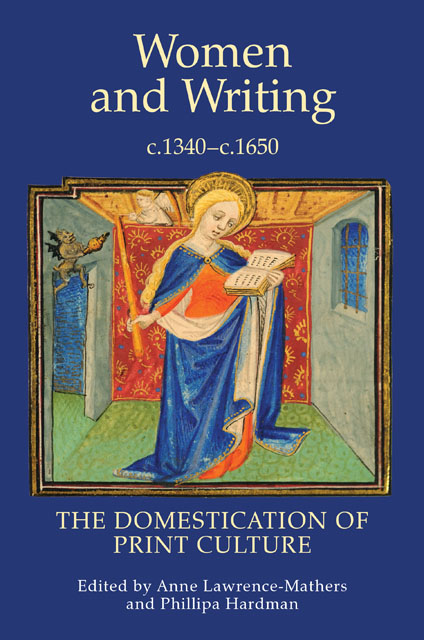Book contents
- Frontmatter
- Contents
- List of Plates
- List of Contributors
- Abbreviations
- Introduction
- Domestic Learning and Teaching: Investigating Evidence for the Role of ‘Household Miscellanies’ in Late-Medieval England
- Domesticating the Calendar: The Hours and the Almanac in Tudor England
- ‘a briefe and plaine declaration’: Lady Anne Bacon’s 1564 Translation of the Apologia Ecclesiae Anglicanae
- Frances Wolfreston’s Chaucer
- Commonplace Book Culture: A List of Sixteen Traits
- Women, Politics and Domesticity: The Scribal Publication of Lady Rich’s Letter to Elizabeth I
- ‘yr scribe can proove no nessecarye consiquence for you’?: The Social and Linguistic Implications of Joan Thynne’s using a Scribe in Letters to her Son, 1607–11
- Fathers and Daughters: Four Women and Their Family Albums of Verse
- The Book as Domestic Gift: Bodleian MS Don. C. 24
- ‘like hewen stone’: Augustine, Audience and Revision in Elizabeth Isham’s ‘Booke of Rememberance’ (c. 1639)
- Female Voices in Early Seventeenth Century Pamphlet Literature
- Select bibliography
- Index
- Misscellanious Endmatter
The Book as Domestic Gift: Bodleian MS Don. C. 24
Published online by Cambridge University Press: 01 March 2023
- Frontmatter
- Contents
- List of Plates
- List of Contributors
- Abbreviations
- Introduction
- Domestic Learning and Teaching: Investigating Evidence for the Role of ‘Household Miscellanies’ in Late-Medieval England
- Domesticating the Calendar: The Hours and the Almanac in Tudor England
- ‘a briefe and plaine declaration’: Lady Anne Bacon’s 1564 Translation of the Apologia Ecclesiae Anglicanae
- Frances Wolfreston’s Chaucer
- Commonplace Book Culture: A List of Sixteen Traits
- Women, Politics and Domesticity: The Scribal Publication of Lady Rich’s Letter to Elizabeth I
- ‘yr scribe can proove no nessecarye consiquence for you’?: The Social and Linguistic Implications of Joan Thynne’s using a Scribe in Letters to her Son, 1607–11
- Fathers and Daughters: Four Women and Their Family Albums of Verse
- The Book as Domestic Gift: Bodleian MS Don. C. 24
- ‘like hewen stone’: Augustine, Audience and Revision in Elizabeth Isham’s ‘Booke of Rememberance’ (c. 1639)
- Female Voices in Early Seventeenth Century Pamphlet Literature
- Select bibliography
- Index
- Misscellanious Endmatter
Summary
Mary Oldisworth, ‘late of the parish of Batsford’ in Gloucestershire, the widow of priest and poet Nicholas Oldisworth and, like him, a member of a well-established local gentry family, died in 1684 and was buried in Tewkesbury Abbey. Mary died intestate and formal arrangements were therefore made under the provisions of the Act for the better settling of Intestates Estates involving her elder surviving daughter Mary Sherwood, John Mann of Tewkesbury (the husband of her younger daughter Margaret), and Margaret herself. There are no details of the deceased’s goods and chattels at her death or of the subsequent disposal of her possessions. For posterity, her most significant possession was the autograph manuscript of her husband Nicholas’s poems made for her in 1644. The volume passed from her to her daughter Margaret. Manuscripts of poetry owned by women in mid seventeenth century England are sufficiently uncommon to be of interest and this one is especially so. It would be reasonable to think it was by chance that the manuscript was inherited by Margaret rather than by her elder sister, and it has often been assumed that this was the case. However, an inscription on the first blank in the manuscript: ‘Margaret Man Her Book Given Me By My Dear Mother’ suggests either that the gift may have preceded her mother’s death or that her mother, though she left no will, had nevertheless indicated while she was still living that the volume was intended for her daughter Margaret.
Perhaps the volume went to Margaret rather than to her sister Mary, who was three years older, because her father dated the transcription and the dedicatory epistle to his wife in the year and month Margaret was born, February 1644. The epistle is from Willington in Warwickshire where Nicholas Oldisworth went (apparently) to escape the plague, which was particularly rampant in that year at Bourton-on-the-Hill, where he was the incumbent. It is not clear if his family went there with him, though it has usually been assumed that they did. However, the inscription: ‘From Willington 1644. Febr: 17’ might suggest that they were separated.
- Type
- Chapter
- Information
- Women and Writing, c. 1340-c. 1650The Domestication of Print Culture, pp. 162 - 176Publisher: Boydell & BrewerPrint publication year: 2010



